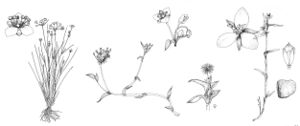Callisia
Iter Hispanicum 305. 1758.
| Taxon | Illustrator ⠉ | |
|---|---|---|
 | Callisia micrantha Callisia graminea Callisia cordifolia Callisia repens Murdannia keisak | Bee F. Gunn Yevonn Wilson-Ramsey Yevonn Wilson-Ramsey Yevonn Wilson-Ramsey Yevonn Wilson-Ramsey |
Herbs, perennial or rarely annual. Roots thin, rarely tuberous. Leaves spirally arranged or 2-ranked; blade sessile. Inflorescences terminal and/or axillary, cyme pairs (often aggregated into larger spikelike or paniclelike units), cymes sessile, umbellike, contracted, subtended by bracts; bracts inconspicuous, less than 1 cm; spathaceous bracts absent; bracteoles persistent. Flowers bisexual (bisexual and pistillate in C. repens), radially symmetric; pedicels very short or well developed; sepals distinct, subequal; petals distinct, white or pink to rose [rarely blue], equal, not clawed; stamens 6 or 0–3, all fertile, equal; filaments glabrous or bearded; ovary 2–3-locular, ovules [1–] 2 per locule, 1-seriate. Capsules 2–3-valved, 2–3-locular. Seeds [1-] 2 per locule; hilum punctiform; embryotega abaxial. x = 6–8.
Distribution
se United States, tropical America, major center of distribution in Mexico
Discussion
Species ca. 20 (7 in the flora).
Selected References
Lower Taxa
Key
| 1 | Flowers white, filaments glabrous; plants creeping, or ascending and stoloniferous. | > 2 |
| 1 | Flowers pink to rose, filaments bearded; plants erect to ascending, or creeping. | > 4 |
| 2 | Robust, stoloniferous plants to 1 m; leaves oblong to lanceolate-oblong, 15–30 cm; flowers fragrant | Callisia fragrans |
| 2 | Weak, mat-forming plants; leaves lanceolate to ovate, 1–3.5 cm; flowers odorless. | > 3 |
| 3 | Inflorescences sessile in distal leaf axils; flowers sessile or subsessile; petals inconspicuous; stamens 0–6; ovary and capsule 2-locular | Callisia repens |
| 3 | Inflorescences pedunculate; flowers distinctly pedicellate; petals conspicuous; stamens 6; ovary and capsule 3-locular | Callisia cordifolia |
| 4 | Plants creeping; leaves oblong-elliptic to lanceolate-oblong, 1–3.5 cm | Callisia micrantha |
| 4 | Plants erect to ascending; leaves linear, mainly 5–25 cm. | > 5 |
| 5 | Distal leaf blades as wide as opened, flattened sheaths or wider, 0.4–1.5 cm wide | Callisia rosea |
| 5 | Distal leaf blades much narrower than opened, flattened sheaths, 0.1–0.5 mm wide. | > 6 |
| 6 | Plants not cespitose or scarcely so; roots persistently woolly; bracts usually minute, scarious, 1–3(–7) mm | Callisia ornata |
| 6 | Plants cespitose; roots glabrous to sparsely puberulent; bracts often elongate, ± herbaceous, 2–14 mm | Callisia graminea |